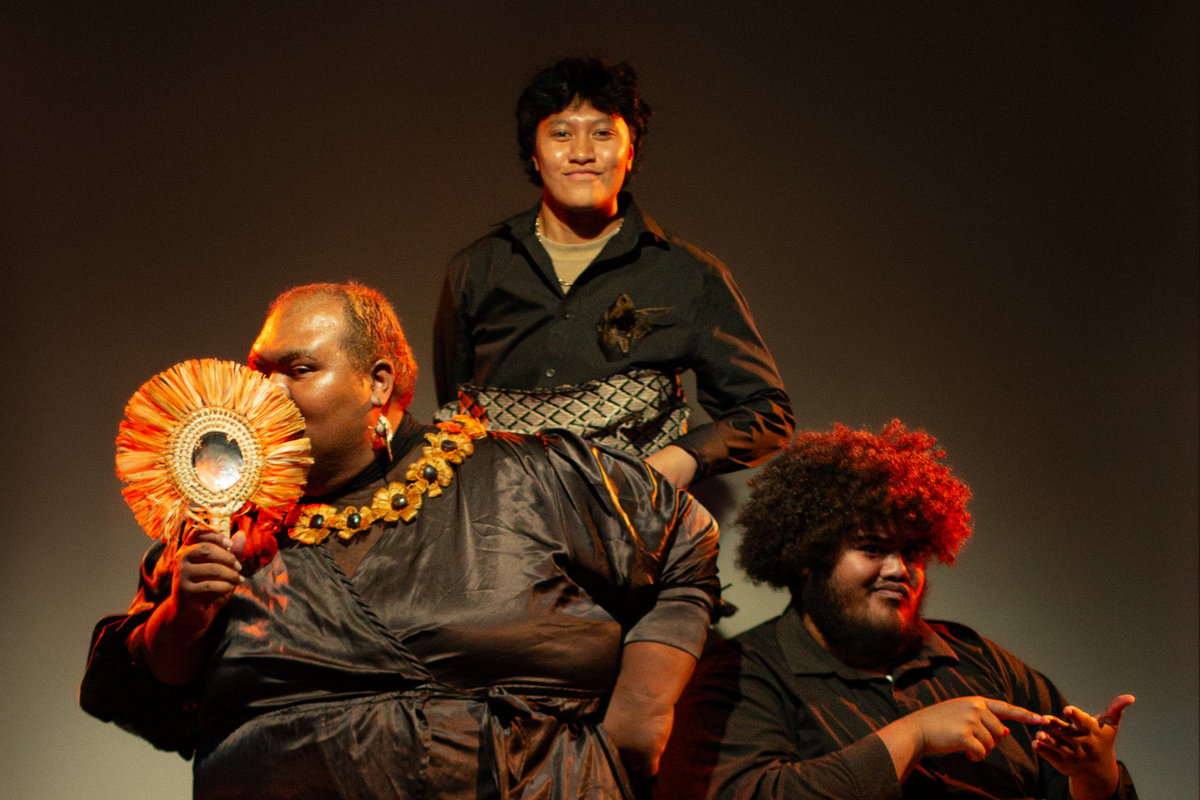Basement Theatre presents: Tafatolu
Tafatolu (directed by Nikeidrian Lologa-Peters and produced by Renee Wiki) is an energetic play inspired by Pasifika mythology. Tafatolu blends elements of dance, music, and poetry to create a funny and emotional experience.

Tafatolu is a play that draws upon musical and physical theatre elements in its adaptation of stories from Pasifika mythology. Inspired by Samoan theatre's Fale aitu, the play is a devised piece directed by Nikeidrian Lologa-Peters, which follows two best friends, Tautai (Nikeidrian Lologa-Peters) and Maau (Tristin Katoa), whose resistance to change disrupts their friendship. This creates an interest from the Gods, the mighty Nafanua (Josephine Mavaega), the mischievous Fiapoko (Netane Taukiuvea), and the charming Fa’ataualofa (Lijah Mavaega), who decide to intervene.
I had the honour of watching Tafatolu last week, which was an undoubtedly fulfilling play full of laughs and emotional storytelling. The combination of elements in live music, physical comedy, poetry, dance, and, not to mention, great acting made it a distinctive experience. The play had a unique ability to create emotion in a way that went beyond realism, all of the elements working together to make a piece of theatre that was, though out of the ordinary, just that much more rewarding. ‘To me, theatre should be big and huge’ is what director Nikidrien said to me the day before the play, and that's exactly what it was - filled with love, so much passion, witty exaggeration, and really great music.
An Interview with Director Nikeidrian Lologa-Peters & Actor Tristin Katoa
The day before the show, I also had the opportunity to interview Nikeidrian Lologa-Peters and Actor Tristin Katoa on the behind-the-scenes of the play's development.
Nikeidrian expressed his inspiration to take the leap into a directorial role and tell this story, as he had been a fan of basement theatre and, upon hearing the story of Maui, had really clear images in his mind of what he could create on stage. He had a vision of creating a fun, physical, and musical piece of theatre that was different and unique. Both Nikeidrian Lologa-Peters and Tristin Katoa are well-versed in theatre, having spent time with Massive theatre company, where they worked with tutors and built connections with people already in the industry. They had both been working with different gigs and plays over the last couple of years and expressed their gratitude to have the opportunity to star in this play together, as they had developed a trust and friendship by working together in the past.
I spoke to them about the creative process of this story, in which their whole team had clearly put an enormous amount of hard work. With this being a devised theatre piece, it was important to them that they were able to create a piece of art that was completely original but remained relatable. Katoa expressed how the play enabled him to connect with his Tongan roots when creating the characters of the Gods. Much of the play was inspired by ‘Fale Aitu’ (translated to ‘house of spirits’ in English) and was a great comedy platform in Samoa, which was humorous and melodramatic. Keeping in line with the theme, the cast looked at Commedia Dell'arte for inspiration in physicality, which helped them understand their roles in more depth. Commedia Dell'arte was comedic theatre performed around Italy in the 16th century that was popular for its improvisations and exaggeration. It remains to inspire modern theatre productions today through its stock characters of Servants and Masters. Maau from Tafatolu is connected with characteristics from Commedia's Pantalone and Zanni, which helped Katoa in developing motivations behind Mauu's presence on stage.
When asked if there were any challenges in creating the show, director Lologa-Peters shared that when touching subjects that hold such significance, like Fale Aitu, it can be really easy to get things wrong. He emphasised that much of the show is a reflection of the knowledge that the performers and he collectively have right now, while accepting that there is still much for them to learn. The musical elements of this play exhibit the prominence of it in Pasifika culture, which complement and merge with physical entertainment to help create ‘Feeling’. Both Lologa-Peters and Katoa expressed the importance of supporting emerging artists and Pasifika voices, noting the empowering feeling of identifying with others in the performing arts who are also in the Pasifika community and the familiar connection that comes with it.
Watching theatre is an excellent break from the day-to-day stress that is university and an incredible opportunity for students like myself to immerse ourselves in the performing arts, and in doing so, gain the opportunity to learn about Pasifika culture. Particularly with plays like Tafatolu, which exerts itself away from the traditional theatre experience by bringing music, dance, and supernatural themes to the modern stage. By supporting performances like these, we widen our perspectives, keep theatre in Auckland alive, and experience the immense amount of talent that it brings.
Disclaimer
The views and opinions expressed in Craccum are those of individual contributors and do not necessarily reflect those of the editorial team or the publication as a whole. While we aim to ensure accuracy and fairness, Craccum cannot guarantee the complete reliability of all information presented and assumes no liability for errors or omissions.




